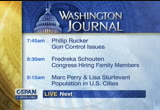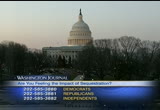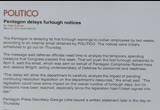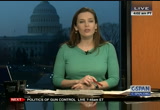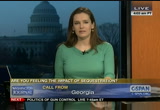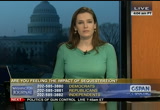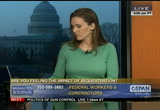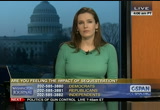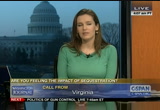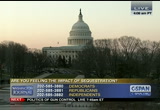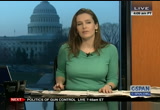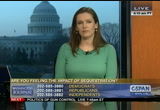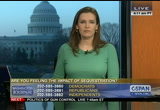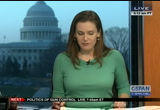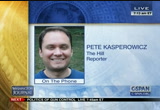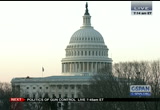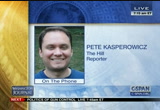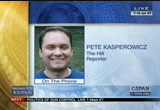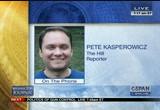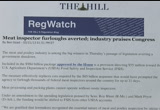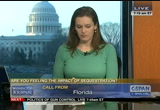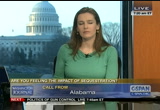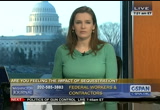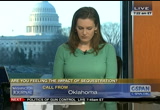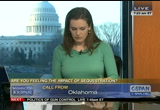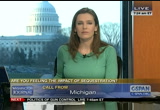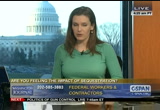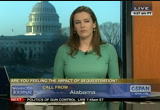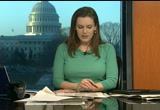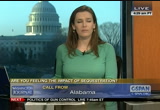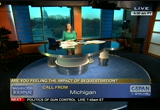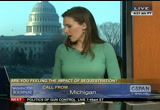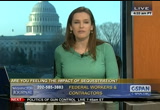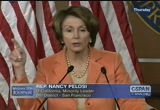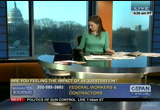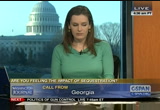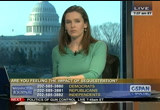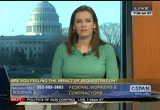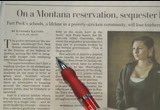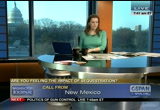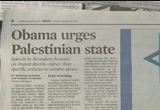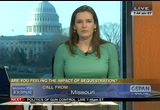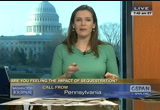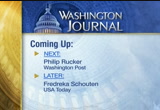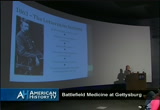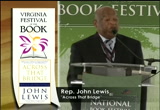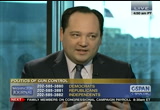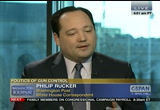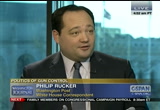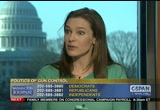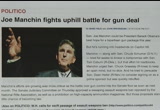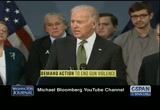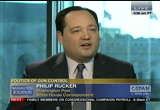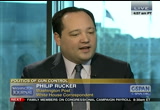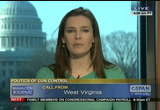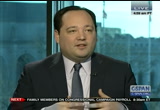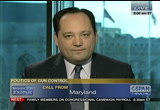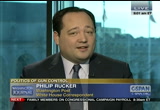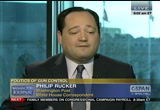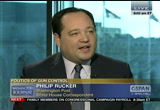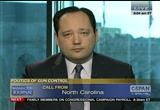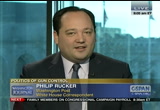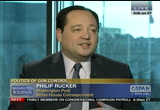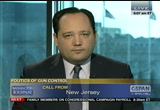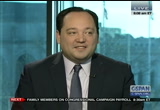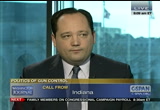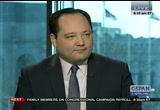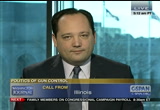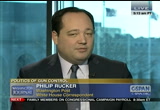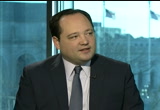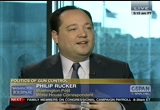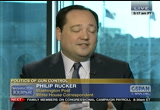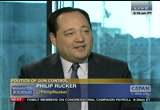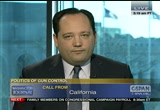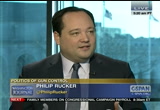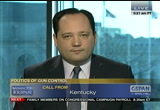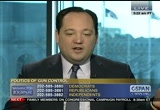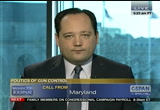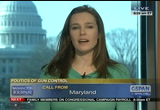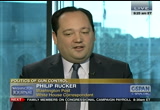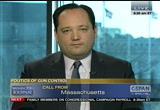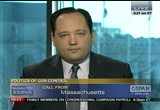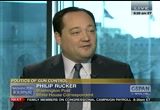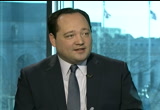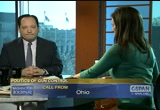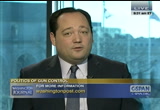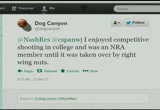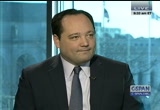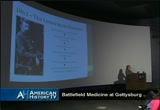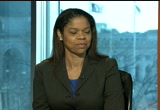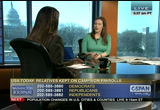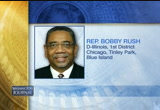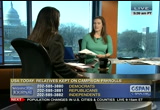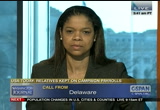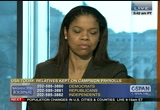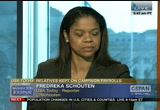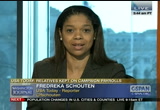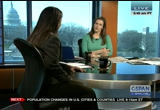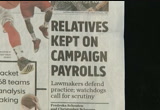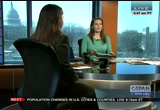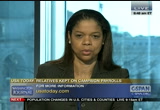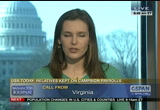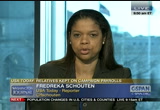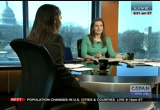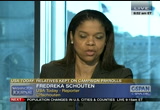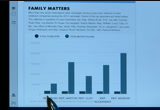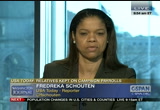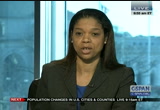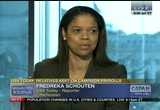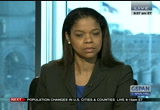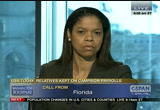tv Washington Journal CSPAN March 22, 2013 7:00am-9:00am EDT
7:00 am
members for their own campaigns. ♪ ♪ good morning, and welcome thisashington journal" on march 20 two. the senate continues work on a budget resolution. president obama wraps up his trip to israel today and heads to jordan. back here at home, we are seeing more news stories about the sequester. we would like to hear from you this morning, whether you are feeling the impact of sequestration. here are the numbers to call --
7:01 am
7:02 am
7:03 am
host: if you are a federal worker, you can call us at (202) 585-3883. , independencelle hall, is cutting hours because of sequestration. the automatic cuts mean fewer people will get to see -- is inour first call georgia. theer: i would like to say republicans, they don't seem like they care about the people. people are getting put out of their houses and people who are trying to kick -- take care of arer sick, the republicans
7:04 am
digging into these red districts. these people vote against their own interests. they are racist and hateful. about howre talking sequestration is impacting people. are you feeling and effect from it? what is happening to you in your community? caller: people are having to pay from these things. host: people you know? caller: yes, people that i know. people are going to lose their houses. my mother is getting meals on wheels, she has a nurse that comes to assist her. there are a lot that people are feeling. and: let's go to mike virginia on our independent line. caller: hi, how are you?
7:05 am
?ost: are you seeing an impact caller: yes. i am seeing a 30% decrease in our revenue. , not just due to sequestration but also more perhaps as a function of the congress and the dysfunction where you have constant crises by what they are not doing. it creates concern and then they want to spend money. sequestration in my area particularly, because we have a lot of defense contracts, also i think more importantly, the congress in their lack of ability to get things done or hammered through -- there arementioned
7:06 am
defense operations going on in virginia, where you live. are you hearing that people are furloughed?oad -- yes.r: i spoke to a friend of mine a few days ago that works in homeland security. he is sort of-- in the upper level. i was surprised to hear him say that he was going to be furl oughed. i'm sure there are going to be a multitude of people that will be. the sequester is not in and of itself the big issue, in my opinion. the bigger issue is the lack of ability of congress to -- you have these constant crises, the , so that made
7:07 am
another issue. and now we have the debt ceiling and on and on and on. it never ends. people get concerned. you look at consumer confidence, and it has since passed continued to decline. a function of not knowing what is going on in the we shouldr, i guess say, in the government, in terms of what they're doing with budget and taxes and everything else. host: we will talk with april -- reporter on the hill. ,et's go to fredericksburg virginia, republican, also a federal worker. caller: hi. i am with the department of defense, and we have done it numerous options on how to deal with the sequester.
7:08 am
the department of defense has been hours with the sequester. it has certainly affected the tempo of our work. i think it is going to severely affect defense workers morale in a lot of ways. this is really ridiculous. both senatorsto from june -- virginia. unless they fix this things, i am not going to vote for them. atm looking very closely how my congressman is handling the situation. anything to doing fix it, i will try and vote him out, also. the congressmen are doing themselves a disservice. host: what is actually happening?
7:09 am
you laid out a lot of discussions taking place at your workplace and terms of various scenarios, how things can be handled. a few, what is happening? caller: i am in education, and we have civilians students and military in the same classes. of theworking options next go around of not having civilians in the classroom because they cannot be in there for five days a week. we are looking at all the different options, have to spend a lot of tried -- time. host: let's hear from another federal worker, a democrat in virginia. good morning, michael. say godi would like to bless america and c-span, and thank you for being here. i would like to say, the sequestration is going to have a
7:10 am
big affect up and down the east coast, from here to texas, that firstpan into the early and second quarter of next year. work, psychologically, i see people slowing down. you know, inlike, a grip, waiting for some thing to happen. i have friends and other agencies, and other parts of virginia and places. i just see the intensity. cut ofu throw in the almost $10,000 for me, for 22 days, you add the payroll tax, i am looking at a setback of -- or a contraction of 13,000 dollars or $14,000 this year alone. has it cost productivity
7:11 am
to be in a waiting. -- timeframe? is that hurting productivity? caller: i see it hurting productivity that way because you see managers more focused on this and making sure and my agency that the human resource portion is, you know, addressed, and the impact on the work versuss mentally financially. so there is a lot of time being .ut into it with letters i believe we are supposed to get our letters today. -- i haveon monday another friend in virginia. he got a call from his boss saying are you going to be in on monday?
7:12 am
you know, that is the -- you know, the impact of getting this letter and knowing that the cuts are coming. thanks for sharing your story. let's take a look at a tweet -- host: turning our attention to what congress has been doing this week. host: here is one of the headlines from "the hill" -- here is pete from the
7:13 am
hill. thanks for joining us. guest: hi. host: what happened with the continuing resolution this week ? guest: we avoided the shutdown, which used to take politicians a lot further. i can tell there is a lot of anger. at least for today, congress is saying we avoided a shutdown, isn't that great. the house passed it yesterday, and it goes to the white house for his signature. it continues what we have seen from government funding. this is the era we live in. and we two parties usually get flatline budgets each year, the continued resolution. it keeps the sequester in place. it does give some people flex ability, which is what you see a delay. they get to assess whether they can make it less painful for workers. we have a working government,
7:14 am
the sequester, and the ongoing pay freeze for federal workers. host: is the sequester here to stay? guest: i am starting to think that it has to be. this is an opinion based on what has happened. it is harder to see how the two sides will reach an agreement when the democrats say let's replace half with taxes. i don't think democrats want to get in. it is hard to sing who -- see who will come down from their position. host: we are seeing other vote on budget issues. guest: the senate is going to -- they call it being -- the vo -rama. it is a democratic budget plan.
7:15 am
it calls for tax revenue to help reduce the deficit. it calls for more spending. we are in the funny process where today, we will wrap up beforehand 50 hours of debate and start the unlimited amendment process. any issue that you have heard complaints about, we might see votes on today. droneld be stuff like strikes against u.s. citizens, it could be taxes and repealing healthcare. the point to remember, this is adding on to a budget resolution. it is interesting and it may give people clues as to what appetites there are in the senate to pass or repeal certain elements of policy. host: the headline says the senate is poised to pass a budget. do you expect it to pass? guest: we do expect it to pass.
7:16 am
behink the democrats will able to control the process and get it to pass. they have a small window. you would need vice president biden to come down and break the tie. the significance is, this is the result -- there is a lot of pent up frustration on the republican side. that is why we might see a late night tonight and into the morning. once it is passed, i think a lot of people will feel better and democrats will say we passed a budget. republicans will say we got to complain about this budget grade it is hard to see how the senate reconciles with the house budget. we don't know that there will be an effort made to bring the two together. they move in opposite directions. host: what happens after congress comes back from the break?
7:17 am
what are you going to be watching for, assuming the budget it's through the senate? what: we would look for is next on their agenda. they get to move back to a regular schedule. the senate will take up a gun bill, we have heard news of that. the house will be looking at more job-related programs. we arese will make -- not sure, but something to do with making life easier for employees if they have an emergency, a way to give themselves time to take time off from work and deal with family issues. from there, a lot of the big stuff will go away right away and we will be left -- the next thing will be the debt ceiling. that is an issue that is on the horizon. they have to figure out how do we do this. host: thanks for talking with us.
7:18 am
7:19 am
john is our next call in florida, republican. the railroadked for over 30 years. i got seniority buildup. i used to get laid off every year. i am so sick of these federal people not ever -- crying about they will lose 22 days a year. this is ridiculous. they can't fire them. they can't lay them off. all these other companies, when their business goes down, four or five are laid off this winter. these people have got to take their turn on being laid off. the fact is, i don't know how we can lay them off anyway. they get more money in the off theirking 2.5%
7:20 am
budget. they should have plenty of money left over. this is crazy. these people keep going on and on. i mean, i was laid off five years one-time and had to go out of of state for five years and work. and: let's talk to maryland huntsville, alabama. what are you experiencing? nasar: well, i work at and huntsville. we call it rocket city. this is the home of the saturn 5. i am a specialist. my greatest concern is the on the future see of the workforce. we are losing more than half of
7:21 am
the number of college interns that we normally have. host: science and tech? caller: yes. host: that has been decided at this point? caller: yes. it experienced a $38 million cut in fy 2013. host: is sequestration also impacting you? caller: absolutely, it is impacting us, not only sequestration, our economy is at a standstill because the program ended. we thought massive layoffs here. there was a delay in decisions on the replacement vehicle. host: here is how the facebook
7:22 am
someis going so far -- are saying they are not seeing an impact because of sequestration. the next call, tulsa, oklahoma, independent. caller: good morning. i don't know where to start. the thing i don't understand is why is it that always the working poor are impacted the most? the top dogs -- i hope you'll forgive forgive me for that -- the top people, nothing affects them. we are paying for them for airplanes and yachts and things. in tulsa, oklahoma, i had the occasion to go to a health service and was under serves. it was packed. i get solicitations on the phone for financial help.
7:23 am
i am retired. i am a vietnam vet. they have cut back. now, the churches are trying to fill in as much as they can. why is it always the underserved that have to wait on someone sitting in washington, d.c., making decisions for us? and senatorsan are not affected by anything. look at how may times they left on vacation. tulsa, ourin governor here, he wants to cancel what they call obamacare here in oklahoma. it ise all of the -- overflowing not only with the people in tulsa, but the surrounding areas. they come in and the poor are going to work in walmart and other places like that. they spend almost half the
7:24 am
money just to get to work but they might make when they get there. this whole thing has got to change. i fault the american public, at least the. are people in syria, they fighting their government for what they think is right. i don't know what it takes to get americans upset enough to get out in the street and demand something. thank you. host: comments on facebook -- host: let's go to michigan, republican. caller: good morning. i retired in 2008 from gm. .bamacare is a mess
7:25 am
sequestration isn't going to hurt me. the government hurts me. the gentleman from florida, god bless him. east coastto the recently, massachusetts and new york. people, you don't buy american cars. why should i care about you? all i see is foreign in massachusetts and new york. you buy the non-union car. you by the korean car. we are the only free country. i laid my life down to keep my country free. and i willo stay fight. thank you. host: we are looking at the impact of sequestration, whether you are seeing an impact in your community or services that you rely on. a photograph of john boehner
7:26 am
says he wants budget cuts or reforms to accompany company a boost in the debt ceiling. the speaker held a news conference to talk about sequestration and whether or not a grand bargain could be negotiated between democrats and republicans. >> we have made clear we need cuts and reforms to put us on a path to balance the budget. president has been clear that he will not address the crisis until we are willing to raise taxes. at this point in time, i don't know how we go forward. i would suggest out of this budget process might be our best opportunity. >> speaker boehner. our independent line. a federal worker.
7:27 am
what is your experience right now? caller: white a bit. -- quite a bit. i work with the air force. you can see the tuition assistance has been suspended. that has been a big impact for a lot of people. for federal workers, it is a 20% hit for a furlough. this fiscal year, a lot of money has already been spent halfway through the year. they have to make up the difference with the money that is left over, which is -- it might not seem like a lot but there are quite a few federal workers that work hard. you don't get overtime, so you try to do what you can with whatever you have. i have quite a few friends on active duty that have had to suspend training. for reservists, they have had to
7:28 am
.djust on when they can work the impacts on whether they have a good year and it impacts retirement. who works for -- the gentleman who works for uaw, realize it is a more consultative, especially -- it is more complicated, especially companies that employ american workers. it does not seem to be getting around in the media. you will start is the economic changes want to see major are suspended. people get laid off and the impacts that come from that. host: stay on the phone with us. the alabama newspaper has this front page headline --
7:29 am
host: officials analyze the spending bill. does that matter? there is a number that leaders have to meet. it may have impacts, but we would not have known either way. when the next crisis comes, we have to try to adapt to see what happens. .t may be 20 days i don't know what that number is going to be, but there will still be an impact. when you set up contracts, you can't do it a week at a time. you have to do it several months out. you can't recover what time. host: thanks for sharing your story. the headline in the "wall street journal" --
7:30 am
7:31 am
three words, total republican failure. they have is bigger of the house, which is a total and utter failure. he can't pass one of his own bills. in the senate. they filibuster the own bill. when you're working in washington, d.c., working against the middle class, it is total republican failure. withd that in michigan this adolf hitler governor that we have. he has totally ruined the state. i summoned up in three words, total republican failure. host: here is a comment on twitter --
7:32 am
host: ron says foolish americans -- host: carolyn in iowa, republican. share your thoughts with us. caller: i want to make a comment about the sequester. i don't know if many people -- host: are you still with us? we lost her. here is a story, a commentary piece in the baltimore sun, sickening cuts to nih.
7:33 am
a former johns hopkins medical dean writes that we appreciate the fiscal challenges and to recognize spending must be cut. researchers are tackling our biggest challenges. they point out that albert einstein was 26 years old when he his theory of relativity. james watson was only 25 when he studied dna. have you felt the impact of sequestration? if you are a federal worker, call us at (202) 585-3883. republicans can reach us at
7:34 am
(202) 585-3881. independent, (202) 585-3882. host: let's hear from nancy pelosi on this a budget process. >> if we are going to strengthen right here and now for us seniors, then that is what we should do and the same with medicare. it should not be with republican so they can continue to give tax breaks to special interests at the expense of seniors who are dependent on medicare and medicaid and social security. democratic minority
7:35 am
leader, nancy pelosi. , thendependent line impact of sequestration. are you feeling it? i am.: i cannot get a job where my town is anywhere. the budget cuts are killing everybody. , republican and democrats are not doing their job. they are spending money on drums -- drones. it is not cool anymore. [indiscernible] fors going to affect us all the budget cuts. the budget cuts are going to kill everything. 'sst: our poll on c-span facebook page, you can go to
7:36 am
facebook and finding c-span. we are asking are you feeling the impact of sequestration. 50 people are saying no and only 15 say yes. georgia, our federal workers line. hi.er: i appreciate you taking my call. and i federal worker, work in a place that has 25,000 employees. i am also a manager, and we get -- wed on a daily basis get briefed occasionally. i believe sequestration is ofting today in the areas
7:37 am
the united states where there is a large military presence, especially the ones that have federal employees. that theings indicate in a 30%nomy is reduction in sales of cars and stores around the local community. it is a vast geographical location. we do a lotmagine, of business with large companies outside of the base. there has been an impact of people preparing for sequestration. i keep hearing this 20% number.
7:38 am
there is a calculated. when i get my numbers, my never came up to 34%, so i'm not sure where they get the 20%. that is what i want to say. i appreciate you taking my call. twittere of our comments says, this is a big smokescreen. caller: i have often said that we have a lot of waste in certain areas. from therked all over pentagon all the way to down here in georgia. what i find, people are very hard workers. there is no doubt in my mind. maybe five percent of people don't have full-time jobs. the reality is, they are very hard workers, we are very patriotic.
7:39 am
we are also very educated workers. the private sector, what we have to offer, the american public not getting their money's worth. andwaste is an paperwork the red tape that we have in government. if we can illuminate -- eliminate some of that waste, we can not have the cuts in my opinion. host: here is another perspective on the sequester story, front page of the "washington post" --
7:40 am
7:41 am
is a region this reporter is looking at and showing there is an impact in terms of cuts in staffing. let's hear from new mexico, our independent line. caller: good morning. complaint or problem with this whole situation is, everyone seems to be blaming the republicans. it is also a democratic problem. the president is also putting down the republicans. to me, when he became president, you have to drop your democratic party. you truly become the leader of both parties.
7:42 am
to bring them together, and they need to get together. host: another perspective here on twitter -- host: let's take a look at some other stories in the news, president obama's trip to israel, headline in the "usa today" -- you can see the photograph of the american president with the array -- israeli president in a test after obama was awarded a medal. obama gets enthusiastic response in israel. then we see obama urges palestinian state. we cane of other stories look at in the news today, flipping through the paper, the
7:43 am
"new york times" looks at women in the senate. you can see the graphic, they look at who these women are and how it has been a building force overtime. you can see here, the growing numbers of female senators. a womanl has approved to lead the interior apartment -- department. sec chief is excited to announce a departure. we expect to hear him announced that he is stepping down, leaving the agency after four years. that term focused heavily on improving internet access across the country.
7:44 am
ont: a couple of more calls whether you are feeling the impact of sequestration. a retired federal worker. caller: i am not a retired federal worker. in 2008, i lost my job as a construction worker. therned to usa jobs, national parks service and things of that nature, historic buildings. i was up for a job in arizona recently. i did two interviews and expected to get hired. since superstition, nothing has happened. i feel it is affecting -- since sequestration, nothing is happen. host: you are blaming that?
7:45 am
caller: yes. host: republican, what is your thought? theer: i think that sequestration will have impact only if all at six allow it in that way. allow it.s i know superstition is a reduction in the increase in the baseline budget. it is a reduction in -- of the increase for the current year. that means the current budget or last year's budget is still intact because it only affects the increase for the current year. if it is intact, how could it affect jobs that are already existing? we have heard from federal workers. they are think that
7:46 am
commenting on things that are eirl because there -- thie superiors are being forced to put cuts in place. is anseline budget increase over last years of budget, which which means last years a budget is still intact. --t: let's look at a file final tally on our facebook page. more people are saying no. '. yes that's all for that segment, looking at sequestration. coming up, the politics of gun control. comes up with something new. later on, members of congress who paid relatives to work on
7:47 am
their campaign. we will be right back. ♪ if supplies were to be issued by brigade and a hospital to be created by each division and personnel and equipment the same. that means when the battle is taking place and over, there is thatone place per division those wagons with supplies need to go. the same thing has to be prepared and in place for the army medical corps in order to evacuate the wounded, get them to the right, have enough supplies, get them treated. there has to be a system. they transported the wounded to a station that is pretty close to the field of battle via stretcher.
7:48 am
this was no easy task. they were trained at this point that when the front stretcher bearer starts off with his left foot, the rear steps off with his right to decrease the jostling of the patient and to face forward and be able to get across, which in gettysburg, was difficult. , battlefieldnd medicine at gettysburg, saturday at 10 p.m. eastern on c-span 3. to believe in something that is so right, so dear, so necessary, you have to get in trouble. before we got in trouble, we studied. we did not just wake up one morning and said we are going to sit in. we did not just dream that one day that we're going to come to washington and go on a freedom ride, that we are going to march .n washington as we did in 1963
7:49 am
we studied, we prepared ourselves. .hey intimidated so many people black power. when they use that word or that phrase, black power, many people thought black power meant the structure and -- .estruction, destroying america it was not anything about destroying america. it was about rebuilding america. a new paradigm in terms of how we could truly be. the land of the free, the home of the brave. >> congressman john lewis and olympic gold medalist share their experiences during the civil right movement live, saturday at 8 p.m. eastern, part
7:50 am
of booktv on c-span 2. continues. journal" host: white house correspondent, thank you for being here. gun control. we saw a couple of things happen in the senate this week area leader reid, the head of the democrats in the senate is coming out now with a proposal, a gun bill. guest: his abilities going to of -- include the pillar his efforts, which is universal background checks. currently, it is against the law to purchase a gun if you are a criminal or have a dangerous record but not all require background checks. democrats are trying to put forward a bill that requires universal background checks. that has been the top priority for president obama.
7:51 am
this bill will not include the assault weapons ban, which would ban certain types of high- capacity assault rifles and other weapons. there was not enough support in the senate to feel like that was possible to include and be able to pass the floor in the senate. it is a bit of a blow to the president agenda. host: here is the headline in the "washington post" -- how significant is it that the lead democrats and the senate is coming up with something and is going to move forward? it is significant that it is harry reid. prided himself on the support he received from the nra. he was able to use the support of gun rights groups to defeat
7:52 am
in aepublican opponents difficult race. he has been reluctant to support gun control throughout the years. since the newtown shooting, he has been largely silent on the issue. it has been a big question on what harry reid would support on the floor of the senate. the fact he has introduced background checks is significant. has beennne feinstein an advocate on the assault weapons ban and something she has worked on for a long time. thebig was the defeat of assault weapons ban, and take us behind the scenes. it was totally expected. i think ever since the newtown shooting, we knew there was momentum building for gun this hugegislation, popular support around the country for that measure. the band has been questionable, partly because you are taking
7:53 am
away the rights of ordinary citizens to own a certain kind of gun that they currently own. would be banned under this legislation. it was just not clear that they would be able to get the support of any republicans in congress and also some democrats in the senate that they would need to win over, including harry reid who are up for reelection in 2014. we always expected this would not make it all the way. this brought a more formal end host:worried host: -- tell us about why these are crucial votes. states like alaska, states like montana, louisiana, north carolina, which goes back and
7:54 am
forth. why is it a tough call for them? guest: it is difficult. these are democrats who won their seats, in states that are traditionally republican because they can make good on social issues and cultural issues. you have gun control, other measures that they tried to avoid talking about in their campaign. a lot of them were endorsed by the nra or were not strongly opposed by the nra. for them to come out and take a position on guns is divisive in their home state. a democrat from west virginia has been a key player in this debate and has been trying to bridge a bite -- bipartisan accord on background checks. he is facing a tough situation back home. his constituents are proud gun owners. the nra is strong there. there are others, north mark pryorlaska,
7:55 am
down south, they are going to decide what to do. to the whiteurn house and talk about what is happening there. the vice president went to nor -- new york yesterday. here is what he had to say yesterday in a press conference. [video clip] ask one question, think about newtown. think about newtown. think about how many of these children and teachers may be alive today, had he had to manyd three times as times as he did. think about what happened out in -- when gabby gifford was shot and wounded. think about when that young man had to try to change the clip, had he only had a 10-round clip and fumbled.
7:56 am
how many more people would have been alive? >> tell me how it violates anyone's constitutional rights to be limited to a clip that ords 10 rounds instead of 30 in aurora, 100? that isa false choice being presented to the american people by those who are taking on our position here. host: that was a vice president biden yesterday. here is the front page of the "daily news" -- what is the impact of this? guest: ever since the shooting in newtown, they have tried to use that moment to gather support as this debate has gone on a month after month, to maintain the emotional momentum. that is the vice president tried to do yesterday in new york.
7:57 am
he was in connecticut a couple of weeks ago, one town over from .he town every time president obama gives a speech, he brings up newtown. they see this as critical in wants the american public gun measures. host: how much power does the vice president have and what does that show in the priority list of the white house? unless there is a tie, he can be a tiebreaker. this is helping to frame the debate. build public support around the country and pressure lawmakers to make them feel like this is of the they have a moral obligation to do. that is a word he and the president use a lot.
7:58 am
every week that goes by, he is having a speech that has to do with guns. he is making this a centerpiece on his agenda. they see this as a critical part of the second term, the domestic agenda. host: if you would like to talk with our guest, here are the numbers -- host: we are focusing on the politics of the gun control debate. west virginia, independent. orler: this gun ban background checks is not going to curb or stop anything. anybody that wants a gun can get one, any time, just about anywhere. host: you mentioned a couple of things. caller: that is not going to stop anything. host: no measures whatsoever? caller: no, it is not going to help. host: we were talking but your
7:59 am
senator just a few moments ago. how influential is this in your vote? caller: everybody i talk to everywhere, he is out, he is gone. they are already getting rid of rockefeller. that is another plus for our state. background checks, that is not going to stop nothing. guest: that is exactly the problem. there is a lot of opposition in their home state to anything that could be perceived as taking away any kind of second amendment rights. background checks does not take away a gun from anybody who was a law-abiding citizen. the proponents of background checks feel like it will help keep guns out of the hands of dangerous people, people who commit domestic violence, folks who should not be owning guns and using them on the street. host: gloria, democrat line.
8:00 am
caller: i would like to say, i don't think background checks would have prevented the newtown tragedy, but gun owners and sportsmen, intelligent people should be willing to register their gun at the shooting site when they want to go to the ranges. check them out only stating their destination, and keep the guns under control since we cannot control the people. 's mother,is young man they both need to be grieved as well as the children. it is a terrible situation. i thought it was better that she was dead than to see what had happened. put themselves in
8:01 am
.ther people's shoes host: you sound like you are getting emotional. this issue is touching you? caller: it is, not because i am personally involved, but i have three great grandchildren, and it is such a scary world. i am really emotional about everything that is going on. thank you for listening. host: we will go to philip rucker now. she talked about all other -- a couple of other items she would like to see happen. guest: she brought up a national registry of sorts, something the nra and gun rights groups have opposed. it is not even really under discussion on capitol hill.
8:02 am
even democrats are not broaching the subject. i think background step -- that ground checks is a -- background checks is a step that the nra could support but a registry is not on the table right now. from here is a headline "the baltimore sun." happeningctivity is at the state level, philip rucker, and where are the areas to watch? guest: a great deal of activity is the answer. a couple of weeks after the newtown shooting, new york test some of the toughest gun bans, including one that is tougher than what dianne feinstein proposed. governor cuomo, who is seen as
8:03 am
hasesidential candidate, been out on the along with martin o'malley, the governor of maryland. he has some of the toughest proposal in the nation. in the state of colorado, the governor signed some tough measures. the is the state where movie theater shooting happened in aurora, colorado. ever since that shooting there has been momentum for tougher gun laws, but that governor is .een as a national player host: in "the denver post" -- guest: that is right. colorado is a test for how this will play out in the states, but one thing to keep in mind is that it is easy to bring guns
8:04 am
across state lines. you can do anything you want in the states, but it will not solve the problems. chicago, illinois, has some of the toughest gun laws, and some of the highest murder rates. tons of children and teenagers are being shot. guns are coming across the border. it is more symbolic than anything else. host: jacksonville, north josh.ina, 'sller: district of columbia ,ase is controlling the debate and justice scalia says it supports the holding in the u.s. versus miller. ar-15 bhutto as your guest
8:05 am
as yourd -- ar-15's guest suggested, are in extreme coming use. several manufacturers make them , and many people own them, not like -- not just former military personnel like myself, but civilians who use them for hunting. one of the previous callers suggested we should check weapons in an armory and only check them out upon giving them verification of what we will use them for. host: thank you, josh. guest: he is right that the ar- 15 is one of the most popular weapons. the proposal about the armory is not something we are hearing in the debate. he mentioned the supreme court precedent. one of the talking points from
8:06 am
the nra and gun rights activists is that any of these measures would infringe on second amendment rights. the president says he supports the second amendment and these background checks would not infringe on those rights. host: a couple of tweets on background checks. robert wants to know how a background check would have helped in newtown, and amy wants to know how do background checks prevent someone who is temporarily angry from acting on impulse to kill. that theyo not know do prevent anybody that could do something impulsively. that is human nature, of course. what it would do is prevent people who are mentally ill, or who have a criminal past or who are deemed dangerous to society from owning guns. that does not keep them from obtaining again. they could borrow a gun, steal
8:07 am
a gun, and that is what makes this legislative debate tricky and difficult. and there are a lot of ways who want to commit a crime can work around the law. host: stanley, new jersey. independent caller. as far as high-capacity rounds and assault weapons, i think people should be as well armed as the people the government gave money -- guns to --fast and furious right fast and furious. when you ask someone to protect the border, it is kind of insulting. another thing, when the government will not protect people during events such as the rodney king riots, where you had people going into neighborhoods, robbing stores -- maybe you do need an ar-15. i remember on television one
8:08 am
korean gentleman was the only person in the area that did not have a store decimated and it was because he stood outside with an ar-15. host: stanley, do you own a gun? caller: yes, i do. i am a hunter. new jersey does not allow you to own a semi automatic. where does my state get off telling me that i cannot travel to another state where i enjoy hunting, or a friend has land or i have land, to turn around and tell me that i do not have a -- cannot have a hunting weapon because you cannot have a semi automatic in new jersey is overreaching and ridiculous. guest: he raises some interesting points, in particular moving across state lines. that is coming up in the gun trafficking bill, which prevents
8:09 am
.ny type of straw purchases if you buy five weapons, for example, you could sell them in a private sale. there are efforts to prevent the gun trafficking, which would try to limit the ability of people to move guns across state lines. , indianapolis, and indiana. heard caller: i do not think guns are the issue. i think if there are better background checks, people being killed would be prohibited. host: thank you. guest: that is a valid point, and i think both sides in the debate agree with that.
8:10 am
the president has supported some mental health measures. there are certain things the department of human services and the department of education are doing independently of the legislative efforts on the hill to beef up and address the various mental health programs in the government associated with venues and schools. on the other side of the debate, gun rights activists feel strongly that mental health is the chief problem and we will hear a lot about this as the senate begins to talk about this. -- is ailip rucker was white house correspondent for and he coveredt" the romney campaign and has been there since 2005. he also covered the obama transition.
8:11 am
we talked about what was happening in colorado and what was signed into law there. the governor and other western democrats -- how important are they in terms of leading the charge to change the conversation about the gun control debate? guest: they are very important. western democrats have been some of the biggest defenders on gun rights that have not engaged a conversation on gun control measures. the fact that they are talking about it, and the governor of colorado has signed into law these measures is critical. it is not solely driven by people like joe biden and bloomberg and the northeastern establishment. they are trying to get geographical diversity. that is why joe manchin is a
8:12 am
player. it also explains why the democrats in the senate have gone after tom coburn, a republican from oklahoma, who has been most open to a background check bill and he has been negotiating with chuck schumer from new york. it is not clear if he will actually end up supporting what comes to the floor from senator reed in a couple of weeks, but he is very open to it and his approval would mean a lot geographically and also because he is a republican. host: illinois. republican caller. brad. caller: thank you for having c- span. it is great. in canada, they have gun registration. they put it in, 10, 20 years ago. the problem now is that a
8:13 am
bureaucrat has said you cannot own this type of gun. now, the individual is being sued because he owns that type of gun, and they are trying to forcibly taken away from him. not an elected official, but a bureaucrat doing this. this is the problem and the concern i have for the future of the usa and i do not own a gun. thank you. g: i mean, that is a valid point. it is important to point out that all of the measures under consideration, the assault weapons ban, the prohibition on high-capacity ammunition magazines, they would not be retroactive. the government would not take away guns that someone currently owns. they were just ban you from being able to purchase the gun in the future. that is why we have seen so many long lines at the gun
8:14 am
store, where people are buying weapons they fear might be banned in the future, but the government would not take them away if you already own them. host: we saw a piece recently in "bloomberg businessweek" looking at the power of the nra and the debates over guns. they go over some items for gun control opponents to remember him calling them "hard realities. why is that not translating into votes in congress? guest: it is partly because the gun rights groups, the nra, manufacturers, sporting
8:15 am
associations, have been powerful in framing this debate for lawmakers and there has not been nearly as active of an effort on the gun control side. and lawmakers not feeling the pressure of public opinion, and that is something that a lot of groups including organizing for action, outgrowth of the obama campaign, the group that gabby giffords has sponsored, and the mayor bloomberg group -- they have been trying to galvanize what they see in public opinion polls to apply pressure to members of congress and over the next two weeks lawmakers will be home doing town hall meetings and other events and these gun control groups are trying to stage rallies, protests, organized petition drives and find ways to apply that pressure, showing what public opinions polls are
8:16 am
showing, which is support for some of these measures, encoding the background checks bill which gets 80% or 90% approval rating. chart one is a background checks should stay the same or become less strict. let's watch a recent nra ad. sex in a recent closed-door speech to donors, politicians and media, bill clinton spoke about gun owners. a lot of these people, all they have as their hunting and their fishing, or they have been listening to this stuff for so long that they believe it, and we remember barack obama saying "it is not surprising they get bitter. they cling to guns or religion
8:17 am
or cult the arrogance of their superiority reminds us that they do not give us right. we grant them power. they do not make us free. we are free already. as long as we have the second amendment, we always will be. we are america, and our politicians are only as powerful as we, the people, allow them to be. the nra ad -- philip rucker, how effective is the nra message right now? guest: a message like that is effective with the base of the nra and many americans that live in some of these dates -- it's dates -- states. you play and add like that in ,est virginia, north carolina
8:18 am
north dakota, and it resonates. it is a message about the elite in washington and san francisco, which is a reference to nancy pelosi, the democratic leaders in the house, and it is really trying to create these cultural divisions between decision- makers in washington and people back home who have guns and use them for sport. host: "political" tells us that nra fundraising is that the best in a decade. guest: the nra also reports that membership is growing, something the nra has been effective and skilled at -- taking advantage of these moments where their agenda might in washingtont
8:19 am
to really galvanize support of gun owners in the country. host: california. isaac, independent. caller: good morning. thank you for taking. host: sure, you are on the air. am hearing something else, but anyway, i called about this gun control. i think they label it wrong. as long as they keep saying gun control, you will have people screaming bloody murder that someone is coming to kick in their doors and take their guns. that is not what it is about. it is about limiting the number of bullets you can have in a rifle, and the second thing i would like to say is who is going to come to take your gun because if the military comes to take your gun, in your gun is nt going to stop anybody. we are free because we are free,
8:20 am
that is the bottom line. gunt: that is interesting, control. gun advocates talk about gun violence prevention, gun safety, and that is the messaging tool. " as feel that "gun-control a term is seen in a negative light for the reasons you suggested. the president calls it the gun violence retention agenda. host: here is the headline in "washington post." interestingis an group, founded immediately after the new town shootings by mothers who felt emotional about the issue and literally sat around kitchen tables and put together this group, organizing on facebook. they have thousands of members
8:21 am
now and are one of the key players over the congressional recess next two weeks in terms of trying to rally support and press their point with their members of congress. host: mike in kentucky. republican. go ahead. caller: i i am interested in this debate. the constitution provides us with inalienable rights, life, liberty, and the pursuit of happiness. it might pursuit of happiness is taking a 30 round clip out to a field and shooting cans off of a fence post, that is my pursuit of happiness. they will start with this measure, and it will be the first that. it will want to take more. it is all an infringement upon rights. that is why people are digging in with this issue because if it is not this, it will be something else and the rights, the freedoms, they are going to go, step-by-step, one at a time.
8:22 am
host: mike is bringing up an argument we have heard on this show when we have done segments about gun issues -- it starts with one thing and goes with a series of other steps. where does the argument come from and how much does it resonate? guest: it comes from a lot of places, including nra leadership. he even before the new town shootings -- the newtown, connecticut, shooting, the leader of the nra said it will be one after another, they are coming for your rights and that has been a messaging tool by gun right activists, making people feel that any gun right legislation would be an infringement on constitutional heres and a domino effect and we do not see that happening right now in congress were with the president agenda. they have made it clear these are the measures they want and that is all they want done.
8:23 am
there is not any indication that if background checks were to pass that later this year president obama would have a new agenda. host: bel air, maryland, democrat line. jim, good morning. caller: i heard the lady call from maryland and other people talk about keeping firearms in armories. to me, the meaning of the second amendment is home and self- defense against a terrorist-type government. i live in a rural area. i do not know who they think they are going to call if someone breaks in their home or threatens their life. the police will not be there in two seconds. to me, my firearms in my home or my self protection. maryland is trying to pass the flaws that make no sense at all and it mostly is posturing because our governor o'malley wants to run for president and
8:24 am
let me ask you two a question. do you have guns in your homes on the or what protection do you have? , are youy with us, jim a member of any gun advocacy groups like the nra? caller: for years to read am a member of national rifle. we have background checks. i have no problem with background checks, but now maryland wants to fingerprint you. i do not understand where that is going. they want me to register my firearms. well, again, i just ration me, the next thing is confiscation. host: you are ok with background checks, but not registering your gun. no, ma'am. i do not even own a handgun, i have no use for one.
8:25 am
my protection is the hunting guns that i use, but i use semiautomatic shotguns for waterfowl hunting, and we have here in maryland, my golly, since the 1950 us come and they .re limited by law they do not really know what the assault weapon is. that is the battle indianapolis, in the statehouse. i cannot determine what a true -- annapolis, the statehouse, they cannot determine what a true assault weapon is. i have friends in montana that use it for hunting, and that is their choice of weapon. host: thank you for sharing your story. philip rucker? guest: this illuminates one of the stories in the gun debate. the divide is much more geographic than partisan. it is really that people in
8:26 am
urban and suburban areas are more likely to support stricter gun control, and people that live in rural areas where it might take a long time for a police officer to come to their home, or the use guns to fend off a lease or other predators or other-- coyotes predators, they feel the need to have these guns. host: chris, massachusetts. independent. caller: how are you doing? host: good. caller: first, thank you for having the show. i'm a 20-year-old college student and i recently started watching. i come from a liberal state, so guns is something i am not really too familiar with or even interested in, but i think it is very interesting that the public discourse seems to be around individuals and their rights to bear arms and how we are going
8:27 am
to stop individuals from getting guns, but what about the companies that actually manufacture the guns? there are stockholders and people with material interest in our capitalist system that creates and profit off the sale of these weapons, whether it is people that want to deer hunt, or people that want to go into a school and shoot 10 kids. there are people that profit and maintain their lifestyle off the manufacturing of these weapons. so, a lot of the times i feel that is left out of public attention, or public opinion, or what is actually happening. you cannot just look at the people using it when you are not talking about where it is coming from. as far as stricter gun laws and xyz, i could probably go outside, walk down the street, and find a gun really fast, regardless of whatever law
8:28 am
washington, d.c. wants to pass. we have to look at reality instead of through the lens of these laws and xyz. there are laws that say cocaine is illegal. i could walk two seconds away from where i am, by cocaine and come back to my house. whether you make it illegal, it will not stop the problem. yes, it might help to make it not as prevalent, however, it is not going to eliminate the problem, and people who are looking for the law to do that should look somewhere else. we should look at our kids and how they are raised. host: chris brings up a lot of points. thank you. philip rucker? first point, manufacturers profiting off the making of these guns, that is not lost on anyone in washington because these manufacturers have been major campaign contributors and they also contribute to the nra as well. there is a lot of money
8:29 am
involved in gun politics, and lawmakers on capitol hill, over many years have received campaign donations, support, and a lot of the money has come from the industry built up around guns just as there is an industry around cars, television sets. people who make guns, make money, because they sell them for a profit and they would be opposed to any restrictions on the ability to sell certain types of weapons. host: a story in "the washington times" says one company plans to leave colorado. no sooner did the gun controls get signed, that the backlash began. one of the risks colorado faces, and a gun manufacturer in maryland has also threatened to leave. that is something for governor o'malley to think about.
8:30 am
there is pressure in this regard. it is interesting to note that one of the big industry groups is actually based in newtown, connecticut, which is where the shooting took place, and it is really a sign of how the manufacturers are such a big part of this debate. host: ohio. republican caller. justin joining us. caller: hello. i would like to talk about the magazine capacity subject. i hear from the vice president why we should not have high capacity. i will give you a real story. years ago i had a wife and young infant. four adults pulled up to my porch and were up to no good. i had a choice of a six round gun, or a 20 round high-capacity clip. not knowing what these four adults had, it felt comforting having the high-capacity if they came out with a gun each.
8:31 am
where would i be if i had only six rounds? host: where -- what did you do, justin? iller: i scared them off, had my wife called 911, and in rural ohio, it it took an hour and a half for the police to get there. guest: it is a valid point. in terms of the magazine restrictions, the measures under consideration in the senate would ban anything over 10 rounds in your magazines. you would be able to have 10 rounds, not more than that. that is what the president opposed. that is what senator feinstein wants none. it is not clear at this point whether the magazine's bill will get support to pass the senate, although there will be a vote in early april and that is
8:32 am
something vice president biden talks about a lot. they feel that tucson, arizona, shooting, of gabrielle giffords , would not have heard as many people if the magazine were smaller. if the shooter had to take the time to reload his weapon, some bystanders could have stopped him. host: a couple of tweets. card, ok to register your but registering your gun is an infringement? that sounds silly." -- "itcing the nra and feels like it was a call to arms, that is what i saw." "i enjoy competitive shooting and was an nra member until it was taken over by right wing nuts. james says he has a shot up target in his front yard.
8:33 am
the people tot of keep and bear arms doesn't mean just bear them. stronglyople feel very about guns. it is not a debate about financial reform or other measures that we hear on capitol hill and that is why it has been difficult for senators to figure out the position they should take. it is a complicated issue will -- fraught with heavy emotion, and the last time gun measures were passed it was in 1994 and there were political consequences for democrats, and that is what we see play out here. when the senate begins debating this, it will get touchy. host: philip rucker, white house correspondent for "washington post," thank you for being here. guest: led to be here. host: next, a report that
8:34 am
numbers of congress and their relatives to work for them last year. then later, we will find out which parts of the country are growing, and which are losing residents. we will be right back. ♪ monday night on "first ladies,", called a bigot just and an adulterer, rachel before her husband takes office, and emily donelson takes over as the white house hostess. then, angelica van buren is the
8:35 am
on c-s for her father, span, c-span radio and c- span.org. >> the supplies were to be issued by brigade, and they field hospital was to be created for each division. personnel and equipment was the same. what that means is when the battle is taking place and over, there is only one place, per division or core, that those wagons with supplies need to go. the same thing as to be prepared and in place for the army medical corps. in order to evacuate the wounded, get them to the right place, had enough supplies, get them treated, there has to be a system. they transported the wounded to
8:36 am
a station that was close to battle and they did this with a stretcher. this was not an easy task. the stretcher bearers were trained that when this front stretcher there stepped off with his left foot, the rear stretcher bearer stepped off with his right, to be facing forward and able to get across what here, at gettysburg, was difficult terrain. -- >>ts this weekend on this weekend on "american history tv" battlefield at gettysburg on c-span3. fredreka schouten is a ."porter for "usa today you have found 32 members of congress have their family
8:37 am
working on their campaigns. is that legal? guest: it is entirely legal, there are questions raised. it is perfectly appropriate according to the federal elections commission to hire a spouse, a daughter, and in law, to work on your campaign, as long as they are doing bona fide work, and they are earning fair market value. the federal election commission affirmed this more than one decade ago at the request of jesse jackson junior. so, we have seen examples over the years, during an election, of relatives doing work. accounting, recordkeeping filing paperwork with the federal election commission. host: with the numbers you have been able to track, our legislators getting a deal? do they pay them fair market rate, on the cheap, fair market
8:38 am
amount? guest: it is hard to tell because there is not an independent body determining this. --bers of congress designed decide for themselves. we found wide varieties. we found six people that were toing more than six figures relatives over the course of the two year election cycle. wasof the biggest spenders illinois representative bobby rush whose wife earned $147,000 during the 2012 election cycle, about one quarter of the money that he brought in over that two years. she is a longtime employee of the campaign and has earned in over the $360,000 course of several election cycles. some people are paying far less. " findhow did "usa today
8:39 am
out which members of congress and play family members? guest: we took a snapshot of the 20 12 campaign finance reports and we looked at all the last names from the campaign fund recipients and compare that with lawmaker last names. that was the universe that we looked at. the problem -- i am mischaracterizing to say it is a problem -- the practice, like be more widespread as in some cases the family members may have owned companies, and we might not have picked that up, a consulting company that does not bear the name of the lawmakers relative, we would not have seen. ?ost: there is no registry you do not need to register with some group or federal agency if you choose to hire a member of your family? no, you list them as
8:40 am
recipients of campaign funds. host: if you would like to join the conversation about members paying family members to work on campaigns, here are the numbers -- you mentioned congressman rush and you look at other members. give us a sense of whether this is democrats, republicans. guest: it is split. representative joe barton, a republican from texas, his daughter has worked for him and has earned $130,000 over the course of the two-year election cycle including $70,000 in bonuses. host: we also see william lacy clay, democrat of missouri. guest: his sister's law firm works for the campaign.
8:41 am
rodney alexander, republican of louisiana, and buck mckeon, republican of california. guest: rodney alexander is one member of congress that employs more than one relative. he has two daughters. one is a cpa and handles accounting. the other major in finance and handles day-to-day operations of the campaign. host: let's go to the phones and hear from callers. joe joins us from burlington -- wilmington, delaware. let me push the button. caller: it is great speaking to you. thank you for taking my call. what i want to say is the nepotism on the campaign might you eliminate -- well, it really does eliminate the best possible person for the job, compared to having a relative in the position.
8:42 am
it just eliminates competition for the position, the best and brightest minds. thank you. host: joe, before we let you go , would you like to see some sort of law that requires proof that a member of congress has shopped around and found the best person to work on their campaign instead of hiring a family number? caller: that would not be a bad idea. , would like to see that because this happens in u.s. corporations -- nepotism, the good old boys network, where not necessarily the best man is in the job position, or the best woman is in the job position. this opens you up to a lot of questions by your employees or your staff members on a campaign. it opens you up to a lot of, maybe, indecisiveness, inside of
8:43 am
your campaign or your company -- that is all i am saying. guest: it is an interesting point. one of the things members of congress have said to me is they trust their relatives. they know them. they are dealing with a lot of money and they want someone , who willknows them not steal their resources. i heard that several times for members of congress. i again, there is considerable debate because campaign-finance watchdogs are saying you are also asking people to underwrite your reelection, and at the same time, essentially put money in your bank account if your spouse is the person that is on the payroll. host: here is a bit from fredreka schouten's piece in "usa today."
8:44 am
finding support for family members -- explained the dynamic. election rules, you cannot personally benefit from campaign runs and you cannot use the money to pay your rent or your mortgage, but many feel this crosses the line because if you are a member of congress, you are going to toitical action committees companies you might see on your committee, and say please help me get elected, and by the way, this ultimately benefits my bank account. feeluestion is do you especially beholden to people who are paying your relatives? the lineemiah is on from fort lauderdale, florida.
8:45 am
go ahead. caller: thank you for taking my call. i think it is a great idea to have family on the payroll because family is usually their first, and not only that, that family might have office space to use. i agree with the idea of having family on the payroll because i worked on numerous campaigns were the daughter was the secretary and whatnot. i thought that was a cheaper idea and even when i run for office i plan to use family to help me out because it will be grassroots. host: thank you, jeremiah. guest: that is something many politicians have said. host: frederick is counting, tell us more about -- fredricka shelton, tell us more about what jeremiah just brought up, i want my closest confident to
8:46 am
work for me. where lawmakers defensive about this, did they freely talk about this with you? guest: it varies. some did not call me back and did not want to discuss it at all, but everyone who did call me back defended it and said -- in one case, in the case of buck mckeon, the spokeswoman said it is fine because his wife is not earning a commission. she is not getting a cut of this. it is not as if she earns more if he raises more money. she is just being paid for her services. host: here is a story from "usa today" -- it is by our guest fredreka schouten and her co-author. you can find this in a recent edition and on the website and
8:47 am
-- website. boca, raton, florida. i am questioning her because i saw one girl up there earning $135,000 twice in eight to below different campaigns, and i think that should be illegal -- in two different campaigns, and i think that should be illegal. there could be another person earning that money, or two people that split that herod what is the matter -- split that. what is the matter with you people? are americans that stupid? host: ok, william taking issue with that. would you be equally upset if family members were getting paid less?
8:48 am
caller: i would be happy if all of these $130,000 were paid less. host: ok. we will show the numbers again and go over just how much you discovered family members were receiving. guest: we found several examples of relatives earning six-figure salaries over the course of a two year election cycle. it is not as if someone earned $147,000 for one year. it is over the course of a two year election cycle, but, again , it is up to the members of congress to determine how much the campaign will pay their relatives. they have broad discretion. one campaign-finance lawyer that i spoke to who advises republican clients says he always tells them "look, it is not as if a third-party is
8:49 am
going to scrutinize this and make a decision about whether you are paying fair market value or not, but i want you to match up the skills the relative you are considering hiring, look at comparable, in document that you have done so. that will save you a lot in the long term." host: eric, fairfax, virginia, republican caller. go ahead. caller: i have been listening to the discussion and i am not surprised. elected officials continue to engage in behaviors that are counter to why we be -- elected them. i do not know all the facts, but again, i think this is part of a larger problem -- we need to hold elected officials more accountable and thank you for c- span. host: eric, before we let you go, are there ways you would change the law, specific recommendations? not knowou know, i do
8:50 am
that changing the law would be a solution because i do not know enough about the issue. i think we are skimming the surface. with more information about what is really going on, that would give me and the american people the information they would need to make a recommendation for change that would make sense. host: thank you for your call. guest: just a little bit of background -- there have been efforts to change the law. the house, in 2007, passed a bill that would inhibit lawmakers from employing spouses, only applying to spouses on campaign payrolls. it died in the senate. there has been an effort to renew that, and even expand that in this session of congress. a republican senator of louisiana to do stay bill on the first day of congress saying no more relatives on campaign payrolls. i checked last night, it still does not have any cosponsors.
8:51 am
host: where did he get the idea for that and you know why it has not gained traction question mark guest: why it has not gained traction -- again, it is hard for lawmakers to change practices that they feel comfortable with. my understanding is louisiana, at the state level, has anti- nepotism revisions as agree bates -- as it relates to camp and -- campaigns. host: the bill would prohibit spouses, and any immediate family members from driving salaries -- drawing salaries from campaign accounts. on the floor he said it allows politicians to pad family income. michigan, rich. independent color. -- caller. what part of michigan are you calling from? am calling from lapeer, michigan. great job, fredreka schouten.
8:52 am
our taxes being paid on the payroll and do you see the funds being used for other purposes like cars, and other uses that are aside from whatever the election might be about? it seems that the campaigns are run perpetually. i never stop, and the continuation is the most to pass on a legacy to the generations after them that will run for election as well. i have seen that in michigan with our representative. guest: those are good questions. theperson receiving payroll would obviously pay taxes on it like any income. yes, there are examples, though we did not cast a wide net with this particular story. we do see, from time to time, use of campaign funds for cars.
8:53 am
in some cases, members of congress who have as mrs. back in their history -- who have businesses back in their districts will rent space to the campaign, so the campaign is paying their business or family business for the use of real estate. there are multiple examples like that. in the case of rodney alexander, for instance, his campaign account has paid about 32,000 dollars in car leases over the course of the 2012 campaign. >> -- host: the web version of your story gives a comparison of how much the campaigns had in total receipts for the 2012 cycle and how much went to relatives. you can see the comparison here for representative rush, for example, how much went to his relatives, the total he brought in, and then the totals for other members of congress.
8:54 am
why is the ratio important? guest: it gives you a sense of how big of a line item a relative's salary is as compared to other expenses. in the case of someone like representative rush, i think it his 2012ltogether of receipts went to pay his wife, and this is someone who is a longtime member of congress. he raised about just shy of $500,000 during the 2012 cycle. he has not had a lot of competitive races. it is not as if he is spending a lot of money to get reelected, so it is striking, the proportion of the money that goes back into his family income. host: democrats line. john, virginia. myler: thank you for taking
8:55 am
call. i do not blame congress, i blame the people that vote for these people. when someone hires their own wife or family, remember, they the bigger futures because wife will become a lobbyist in the long run, working for congress, and it opens doors for their families so they can make more money. tim daschle. his wife was the biggest lobbyist in capitol hill while he was the majority of the senate. these are the things that these people do. -- can weaid how change the law -- how can we change the law when they're the ones making the law. it is like you are complaining you go to the wolf. it is the same thing. slow process to change ethic and finance rules
8:56 am
in washington. as the caller said, and i have not callie did recently, but there remain a great number of -- tallied it recently, but there remain a great number of lobbyists related to lawmakers who are seeking policy changes in washington on behalf of their clients. host: the caller brought up where it could position you in the future if you work closely with a represented on a successful campaign, giving you . resident -- resume builder is that something you've thought about and reflected in the story? guest: we did not look at it in detail in the story, but certainly, you are in the family business, and it happens to be politics. you do see many people involved in their parents campaigns who
8:57 am
go on to run for office themselves. there are some dynasties, if he will, created out of congress. and, new port richey, florida. republican. caller: hi. how are you all this morning? host: we are good. caller: i have been following this story since it broke and i would like to ask the young lady may be an uncomfortable question, but i think it is an important one. host: ok. guest: go ahead and caller: i have experience with campaigns and personal family members that have been elected, and i have been able to understand how the system of nepotism has evolved. i would like to ask her -- i ," but honestly,
8:58 am
in our times that we live in, "washington journal" and other newspapers that do not want to touch this story, there are other people that would not want to do this story in a certain newspaper because they gain access to people who can tell them about the stories and vet the press, and it is very uncomfortable for some politicians to have reporters come in their office and talk to them when their sister, their wife, or their child is working there in the office. i think this needs to be addressed because our media is being targeted. i would like your opinion on how the media associates the nepotism problem in our country because it is very serious, and it is making a very large impact on the way we govern our country.
8:59 am
guest: i appreciate your question, caller. in my case, i read about campaign finance issues and do a lot of watchdog reporting and i have, sort of, never been discouraged in terms of doing so. we pursue these stories aggressively. i do not cover congress day today. i focus mostly on this. -- and a-to-day. i find wide responses. sometimes numbers of congress are open talking about these issues, and the next week they are happy to talk to you about gun control. it has not proved is a fredreka schouten reporter for "usa today"
131 Views
IN COLLECTIONS
CSPAN Television Archive
Television Archive  Television Archive News Search Service
Television Archive News Search Service 
Uploaded by TV Archive on

 Live Music Archive
Live Music Archive Librivox Free Audio
Librivox Free Audio Metropolitan Museum
Metropolitan Museum Cleveland Museum of Art
Cleveland Museum of Art Internet Arcade
Internet Arcade Console Living Room
Console Living Room Books to Borrow
Books to Borrow Open Library
Open Library TV News
TV News Understanding 9/11
Understanding 9/11